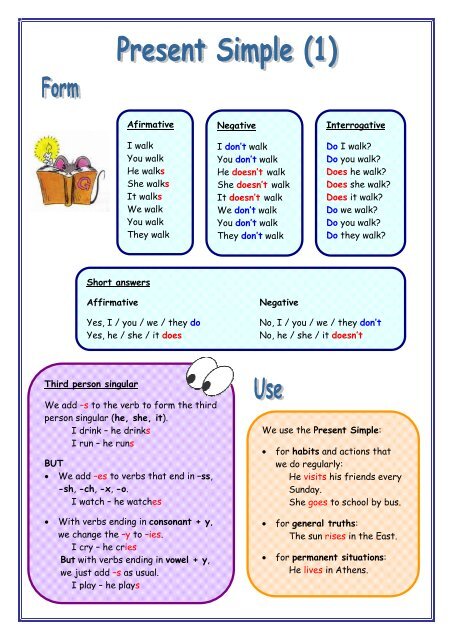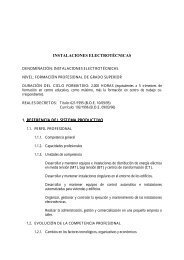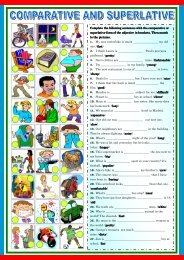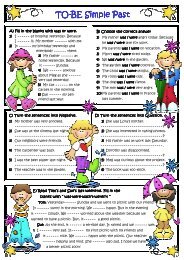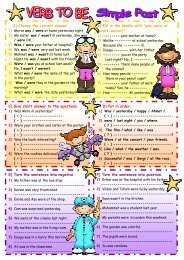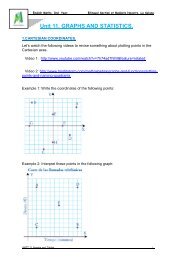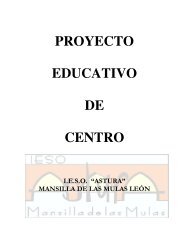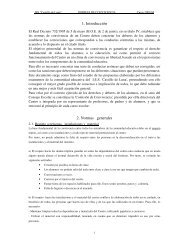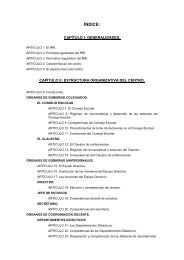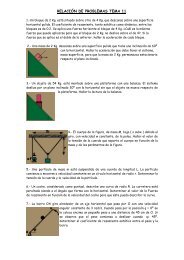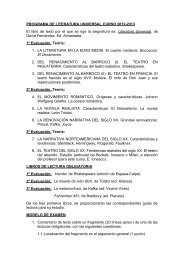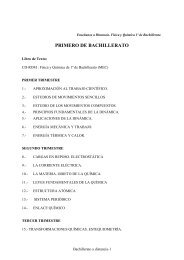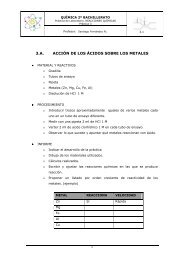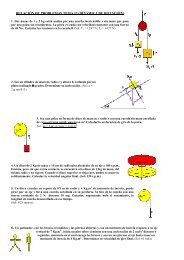Third person singular We add –s to the verb to form the third person ...
Third person singular We add –s to the verb to form the third person ...
Third person singular We add –s to the verb to form the third person ...
Create successful ePaper yourself
Turn your PDF publications into a flip-book with our unique Google optimized e-Paper software.
<strong>Third</strong> <strong>person</strong> <strong>singular</strong><br />
Afirmative<br />
I walk<br />
You walk<br />
He walks<br />
She walks<br />
It walks<br />
<strong>We</strong> walk<br />
You walk<br />
They walk<br />
Short answers<br />
<strong>We</strong> <strong>add</strong> <strong>–s</strong> <strong>to</strong> <strong>the</strong> <strong>verb</strong> <strong>to</strong> <strong>form</strong> <strong>the</strong> <strong>third</strong><br />
<strong>person</strong> <strong>singular</strong> (he, she, it).<br />
I drink – he drinks<br />
I run – he runs<br />
BUT<br />
• <strong>We</strong> <strong>add</strong> –es <strong>to</strong> <strong>verb</strong>s that end in <strong>–s</strong>s,<br />
-sh, -ch, -x, -o.<br />
I watch – he watches<br />
• With <strong>verb</strong>s ending in consonant + y,<br />
we change <strong>the</strong> –y <strong>to</strong> –ies.<br />
I cry – he cries<br />
But with <strong>verb</strong>s ending in vowel + y,<br />
we just <strong>add</strong> <strong>–s</strong> as usual.<br />
I play – he plays<br />
Negative<br />
I don’t walk<br />
You don’t walk<br />
He doesn’t walk<br />
She doesn’t walk<br />
It doesn’t walk<br />
<strong>We</strong> don’t walk<br />
You don’t walk<br />
They don’t walk<br />
Affirmative Negative<br />
Interrogative<br />
Do I walk?<br />
Do you walk?<br />
Does he walk?<br />
Does she walk?<br />
Does it walk?<br />
Do we walk?<br />
Do you walk?<br />
Do <strong>the</strong>y walk?<br />
Yes, I / you / we / <strong>the</strong>y do No, I / you / we / <strong>the</strong>y don’t<br />
Yes, he / she / it does No, he / she / it doesn’t<br />
<strong>We</strong> use <strong>the</strong> Present Simple:<br />
• for habits and actions that<br />
we do regularly:<br />
He visits his friends every<br />
Sunday.<br />
She goes <strong>to</strong> school by bus.<br />
• for general truths:<br />
The sun rises in <strong>the</strong> East.<br />
• for permanent situations:<br />
He lives in A<strong>the</strong>ns.
Expressions used with <strong>the</strong> Present Simple<br />
Frequency ad<strong>verb</strong>s: always, usually, often, sometimes, rarely, never<br />
(<strong>the</strong>y are placed before <strong>the</strong> main <strong>verb</strong>)<br />
Time expressions: every day / week / Friday…<br />
on Mondays / Sundays…<br />
at <strong>the</strong> weekend…<br />
in <strong>the</strong> morning / afternoon…<br />
in winter / spring…<br />
once a day / week…<br />
A. Write <strong>the</strong> <strong>third</strong> <strong>person</strong> <strong>singular</strong> of <strong>the</strong> following <strong>verb</strong>s.<br />
play ____________ go ____________<br />
wash ____________ teach ____________<br />
drive ____________ carry ____________<br />
fly ____________ start ____________<br />
help ____________ kiss ____________<br />
watch ____________ tidy ____________<br />
like ____________ enjoy ____________<br />
cry ____________ mix ____________<br />
B. Complete <strong>the</strong> sentences with <strong>the</strong> Present Simple of <strong>the</strong> <strong>verb</strong>s in brackets.<br />
1. Peter and his friends __________ <strong>to</strong> school by bus. (go)<br />
2. Elephants __________ leaves and grass. (eat)<br />
3. David's fa<strong>the</strong>r __________ in a hospital. (work)<br />
4. The bank opens at 9.30 and __________ at 4.30. (close)<br />
5. Tom and Jim __________ football every day after school. (play)<br />
6. Mr Jones is a teacher. He __________ His<strong>to</strong>ry. (teach)<br />
7. Our lessons __________ at 9.00 and __________ at 3.30. (start / finish)<br />
8. My pen friend __________ in Japan. (live)<br />
9. Mary and her bro<strong>the</strong>r __________ car<strong>to</strong>ons every Sunday morning. (watch)<br />
10. John __________ his room every day. (tidy)
C. Complete <strong>the</strong> blanks with <strong>the</strong> Present Simple of <strong>the</strong> <strong>verb</strong>s in <strong>the</strong> box.<br />
go work ride deliver love jog rest fish walk<br />
Mr Letty is a postman. He doesn't work in <strong>the</strong> post<br />
office. He always works outside in <strong>the</strong> streets.<br />
He __________ letters <strong>to</strong> all <strong>the</strong> people in <strong>the</strong><br />
neighbourhood every day. He doesn't __________<br />
but he __________ his mo<strong>to</strong>rbike.<br />
At <strong>the</strong> weekend, Mr Letty doesn't work.<br />
He __________. He __________ <strong>the</strong> countryside,<br />
so he always __________ <strong>to</strong> his country house with<br />
his wife. Mr and Mrs Letty __________ in <strong>the</strong> river<br />
and <strong>the</strong>y __________ in <strong>the</strong> woods every weekend.<br />
D. Look at <strong>the</strong> pictures and write questions and answers, as in <strong>the</strong> example.<br />
1. play / <strong>the</strong> guitar / in <strong>the</strong> afternoon<br />
Does he play <strong>the</strong> guitar in <strong>the</strong> aftenoon?<br />
No he doesn’t play <strong>the</strong> guitar in <strong>the</strong> afternoon.<br />
He plays <strong>the</strong> accordion.<br />
2. walk / after lunch<br />
_________________________________________<br />
_________________________________________<br />
_________________________________________<br />
3. ride / <strong>the</strong>ir / bicycles / <strong>to</strong> work / every day<br />
_________________________________________<br />
_________________________________________<br />
_________________________________________
4. listen / <strong>to</strong> <strong>the</strong> radio / every Sunday<br />
_________________________________________<br />
_________________________________________<br />
_________________________________________<br />
5. clean / <strong>the</strong> house / on Mondays<br />
_________________________________________<br />
_________________________________________<br />
_________________________________________<br />
6. watch / TV / after school<br />
_________________________________________<br />
_________________________________________<br />
_________________________________________<br />
E. Complete <strong>the</strong> blanks with <strong>the</strong> negative or <strong>the</strong> interrogative <strong>form</strong> of <strong>the</strong><br />
Present Simple of <strong>the</strong> <strong>verb</strong>s in brackets.<br />
Mark: Hi, Tess! What are you doing?<br />
Tess: I'm watching <strong>the</strong> football team.<br />
Mark: Do you watch (watch) <strong>the</strong>m every day?<br />
Tess: No, I don't. They __________ (not play)<br />
every day. They play four times a week.<br />
Mark: __________ you __________ (have)<br />
a favourite player?<br />
Tess: No, I __________ (not have) a favourite player. Everyone on <strong>the</strong> team is<br />
good.<br />
Mark: __________ <strong>the</strong> attacker __________ (move) fast?<br />
Tess: No, he __________ (not move) fast, but he's very clever. __________<br />
you __________ (like) football, Mark?<br />
Mark: No, I __________ (not like) it. I like basketball. It's a great sport.


